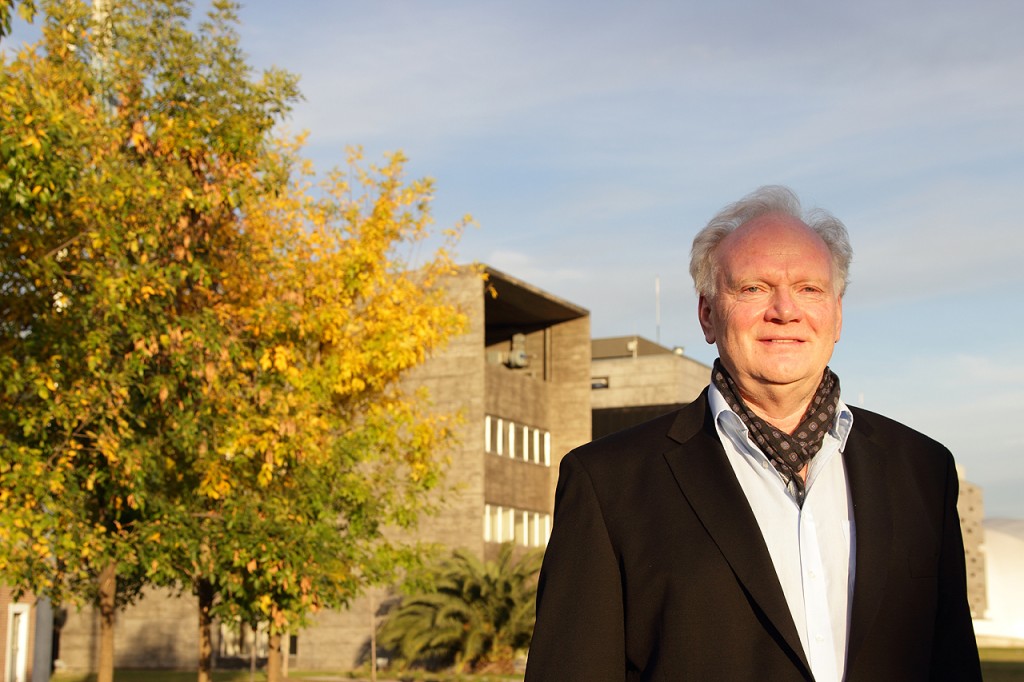The author of Risk Society (1986) died on January 1 and left unfinished his theory on «cosmopolitization», a notion which proposes a novel way of conceptualizing globalization. By Ana María Vara
The first words in Risk Society, the work that made Ulrich Beck one of the key thinkers of the twentieth century, shine as a revelation:
«In advanced modernity the social production of wealth is systematically accompanied by the social production of risks. Accordingly, the problems and conflicts relating to distribution in a society of scarcity overlap with the problems and conflicts that arise from the production, definition and distribution of techno-scientifically produced risks.»
Originally published in German in 1986, by the time the book was translated into English in 1992, it had already sold 60 000 copies: something highly unusual for a sociological essay. The fact was that Beck captured the spirit of the time like few before him; it reflected the realization that science and technology advancements put us before uncertain threats, not as a result of their failure, but of their success.
This view implies that politics becomes a central element as regards technology, since in today’s society risks are a result of what is done, and not of what is given. In this sense, risks are «politically reflexive», as is stressed by Beck; society is no longer confronting nature, but itself and its very own decisions.
A second consequence that emerges from the opening lines of Risk Society is the indispensable role, but not exclusive, that is given to experts. Technical judgment is only one of the relevant voices in the debates on the environmental and social impacts of technology. And this is, above all, due to the limitations of knowledge production: if every new technology creates new risks, uncertainty is inherent in its development and, as a result, it is impossible to complete the expert analysis beforehand.
As Beck explains in his book World Risk Society, published in 1999, «The main question is how to take decisions under conditions of manufactured uncertainty, where not only is the knowledge-base incomplete, but more and better knowledge often means more uncertainty.»
Knowing and non-knowing
In the many lines of research that Beck’s work opened, the issue of the limits of knowledge is especially disturbing in relation to technology. Disturbing and, at the same time, liberating. In an article written with Peter Wehling in 2012 («The politics of non-knowing: an emerging area of social and political conflict in reflexive modernity»), Beck warns about the magnitude and urgency of risks, about the «explosive power» they have because of what we do not know. Taking the global financial crisis, climate change, genetically modified organisms, and the spread of ‘swine flu’ viruses as examples, Beck states that «notwithstanding all assertions to the contrary, numerous spheres of action and politics in contemporary societies are conditioned by non-knowing rather than by knowledge.»
In the first place, this clears out two ghosts of the first modernity already present in Francis Bacon: that our ignorance is the consequence of not having produced that knowledge yet, or that it is due to our prejudices or cultural limitations. Beck holds, on the contrary, that non-knowing is a consequence of our knowledge. Not in Karl Popper’s sense (every new finding opens new questions), but because of a much stronger and drastic reason: because knowledge production is necessarily selective and, as such, it generates both knowledge and non-knowledge. They speak of a «manufactured non-knowing» that remains latent, implicit, and unacknowledged, which eventually becomes apparent «due only to completely unexpected events with potentially grave consequences.»

These observations finally eradicate science’s interpretative monopoly: there are known unknowns, because we need to investigate further, but there are also unknown unknowns, due to the unforeseeable consequences of our technologies. Ozone depletion and climate change are two clear examples of this: no one could have predicted that CFCs—compounds that are hardly reactive, flammable, or toxic—could destroy the ozone that protects us from ultraviolet radiation; no one could have predicted that the increased concentration of an ordinary and essential gas such as carbon dioxide could result in colossal changes to the planetary ecosystem.
In this sense, Beck perfected his definition of risk and developed a formulation that summarizes a complex problem in an eloquent image: risk is not the catastrophe but the «anticipation of catastrophe». He managed to combine the material and discursive aspects of risk, and made it a matter of both the empirical and the social sciences: risk is something «real», it is the consequence of a specific threat, but it only exists if we see it as such, if we define it as such, and doing so forces us to act. With this, Beck also moves away from fatalisms and from any going back, and he reintroduces the so-questioned rationality: if our past decisions put us before the «anticipation of catastrophe», only new deliberations and actions can prevent it from happening.
Theory underway
Beck’s unexpected death last January 1 put an end to an extensive work: tens of books and more than one hundred and fifty articles and chapters, where he provided sociological theory with key aspects to think about contemporary times.
But his last theoretical endeavor remains unfinished: his theory on «cosmopolitization», a new way of understanding globalization for which he developed two key notions, «emancipatory catastrophism» and «metamorphosis of the world». It is significant that the empirical case on which he was working was climate change, a problem that has become the emblem of technology’s unpredictable consequences, as well as of predicted disaster: today we know that something may happen, even though we are not sure of exactly what or how bad. Moreover, we are speaking of a phenomenon that makes all of the world’s inhabitants a «risk community», since nobody will be completely safe from its impact.

Credit / Europe-Asia Research Nework (EARN)
Beck was leading a project funded by the European Research Council, the Cosmo-Climate Research Project, which began in 2013 and is expected to finish in 2018. Under his leadership, researchers from Germany, the UK, Denmark, the United States, Australia, Israel, South Korea, China, Japan, Argentina, and Brazil were working together.
His last published work is a result of this project. In «Emancipatory catastrophism: What does it mean to climate change and risk society?», printed in the January issue of Current Sociology, Beck focuses, not on what we have done and what we will do with climate change, but on what climate change has made with us. «What no one has seen is that the focus on solutions blinds us to the fact that climate change has already changed the world – our way of being in the world, our way of thinking about the world, and our way of imagining and doing politics.»
«Emancipatory catastrophism» has to do with the goods that result from negative side effects. We are before a «metamorphosis of the world», translation of the German word Verwandlung, which changes the landscape of social class; which demands «new norms, laws, markets, technologies, understandings of the nation and the state, and international and inter-urban cooperations»; which forces us to overcame seeing only within national boundaries and to abandon «methodological nationalism»; and which requires to include those who have traditionally be excluded in decision-making processes. «The scale of change is beyond our imagination.»
Beck presented this work last July, at Seoul National University, during a seminar organized by his friend and colleague Sang-Jin Han. As a member of the project, I was among those chosen to discuss it in the meeting and the journal. I presented a series of issues connected to the exploitation and industrialization of lithium, a mineral needed for electric cars’ batteries, which will allow replacing oil. A triangle between southern Bolivia, northern Chile, and north-western Argentina is rich in lithium, and the countries have the political resources to prevent neo-colonial exploitation. To do this, we need to develop technology and to negotiate.
Beck replied to my comment by specifying the differences between neocolonialism and cosmopolitization: the latter implies an opening of power relations and a more symmetrical distribution of dependencies, but he warned that such opening is not «unidirectional» and that, as a result, it includes «the possibility of reinforcing imperialistic power structures».
His absence will be deeply felt because his reflection was still fresh, hopeful, critical, and provocative.
Ana María Vara – Centro de Estudios de Historia de la Ciencia José Babini, Escuela de Humanidades, UNSAM
![]()
26 feb 2015
Temas:



